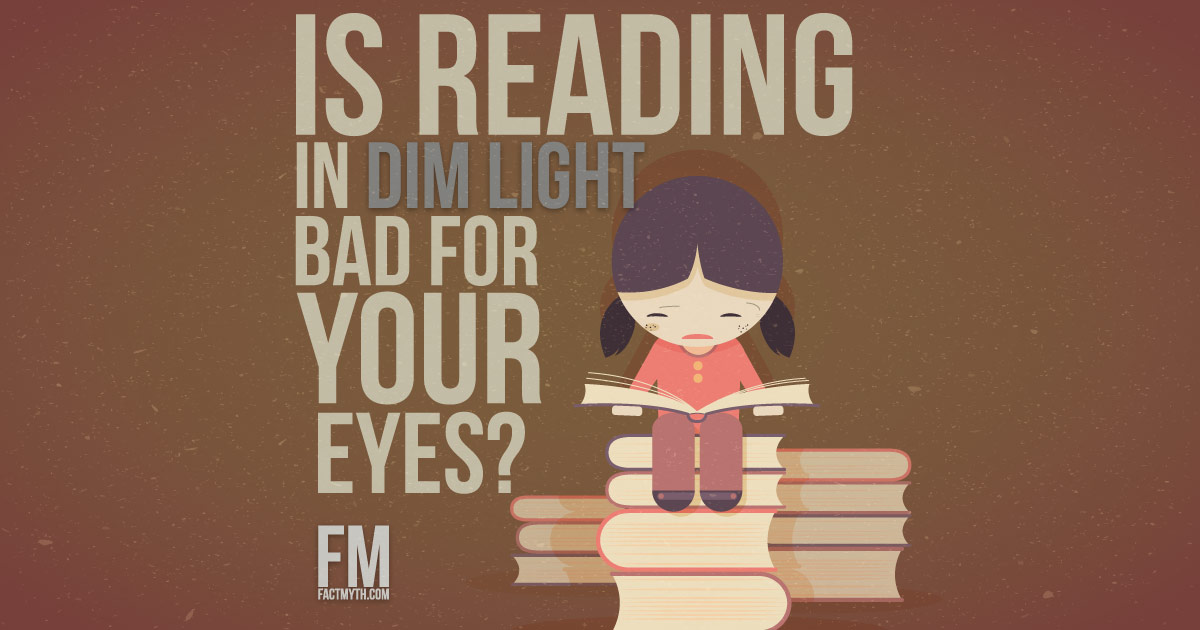Reading under a dim light, sitting close to a TV, using an electronic device or computer before bed, or even just having the lights on all have a range of effects, none of these effects include damaging one’s vision. With this in mind, young children are cautioned to be more careful and further studies are likely needed.
Reading in Dim Light is Bad For Your Eyes myth

Will Reading in Dim Light Hurt Your Eyesight?
Reading in dim light isn’t bad for your eyes. Be it a book or electronic device, reading in dim light will not damage the eyesight of a healthy adult (although it may cause temporary strain).[1]
Negative Effects of Reading in Dim Light
Reading, staring at a TV or computer, or focusing on an electronic device in dim light can all result in short-term eye fatigue (eye strain) or dry eyes. This is because you blink less often under low light conditions. Eye fatigue and dryness may cause discomfort, and light can have psychological effects and affect sleep, but no studies have shown dim light to cause long-term visual damage.[2][3]
Does Reading in Dim Light Damage Eyesight?FACT: There are a number of negative effects related to types of light exposure at nighttime, but none of those effects include damage to eyesight.
Four quick Facts on Dim Light and Eyesight
Here are a few quick fun facts to help you better understand the affects of dim light on eyesight.
- In anecdotal terms, if reading in low light hurt one’s eyes… many of our ancestors would have been blind. Despite anecdotal evidence like this, the truth is that we can’t properly study the effects of dim light on reading due to “ethics”. Like with mirror neurons, current technology would mean studies would be too invasive to perform.
- With the above in mind, “dim light hurting vision” is widely accepted as myth based on what we do know. Nearsightedness (myopia) has gotten more widespread since the first advances in lighting technology, hinting “light” is not the key.
- What we do know about the eyes shows no mechanisms by which reading in dim light could cause damage to the eyes. The idea has been brought up many times to explain “widespread myopia”, but there has yet to be a correlation shown.[4]
- Different electronic devices impact the eyes differently. The impact has to do with the refresh rate, the way it is lit, and the screen type. You can read more about this at the NYtimes.
FUN FACT: If the dim light of oil lamps or candles ruined readers’ eyes, we would have had huge numbers of visually impaired people by the time we got to an era like the nineteenth century that provided easy access to printed books without good artificial lighting. Instead, we lack proof of a causal link between the factors of reading in dim light and visual damage. The absence of evidence is not the evidence of absence, but it isn’t evidence either.

Reading electronic devices in low light won’t hurt your eyes, but there are other negative side effects.
What Happens to Eyes in Dim Light?
When lighting conditions are poor, the eye’s muscles relax and allow the pupil to dilate. This allows more light to hit the retina at the back of the eye. The rods and cones, which are our eyes’ photoreceptors, produce light-sensitive chemicals. These turn the electrical impulses from the photoreceptors into information in the brain. You may pull a book closer to your eyes trying to enhance the contrast between the text and background. This contracts the ciliary muscles around the lens of your eye. When you move the book away, the muscles relax. If you are reading in the dark, perhaps you should be more concerned about paying your electric bill, than about the ideal light level for reading.[5]
How Rods and Cones respond to Light.FACT: When lighting conditions change the rods and cones in our eyes adjust affecting vision temporarily. This could be one factor contributing to the long-standing “dim light hurts your eyes” myth.[6]
What about Vision in Infants and Children? Are Electronic Devices and Low Light Bad for Kids?
An infant’s visual development starts before birth. Unless there is a neonatal issue, babies will quickly learn to focus on an object near them. Shortly after birth infants develop a preference for looking at a familiar adult face. They become increasingly able to discriminate between objects and colors and to differentiate between different amounts of light. We do not have conclusive data about visual damage to young children caused by reading in dim light or watching television too closely.[7]
To be on the safe side infants and very young children should not be allowed to read without enough light or sit close to the television.
Does reading in low light damage vision?- “Reading in dim light Ruins your Eyesight” Webmd.com
- “search results for “dim light” on PubMed Health” ncbi.nlm.NIH.gov
- “Exposure to Room Light before Bedtime Suppresses Melatonin Onset and Shortens Melatonin Duration in Humans” ncbi.nlm.NIH.gov
- “The myopia boom” Nature.com
- “Does Reading in the Dark Hurt your Eyes?” Scienceline.org
- How vision works” health.Howstuffworks.com
- “Your Infant’s Vision Development” Allaboutvision.com
